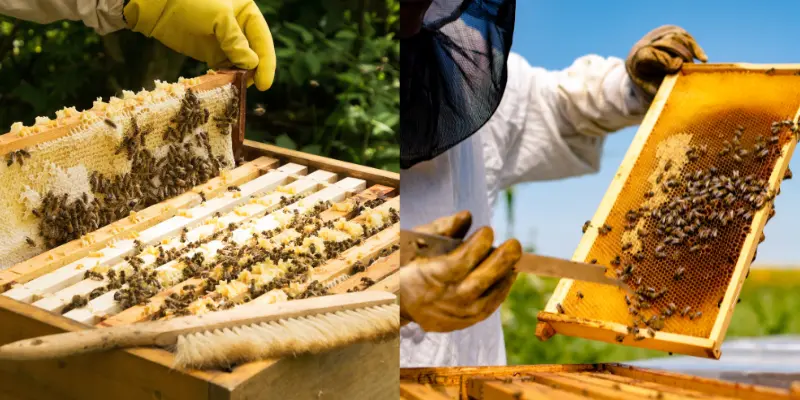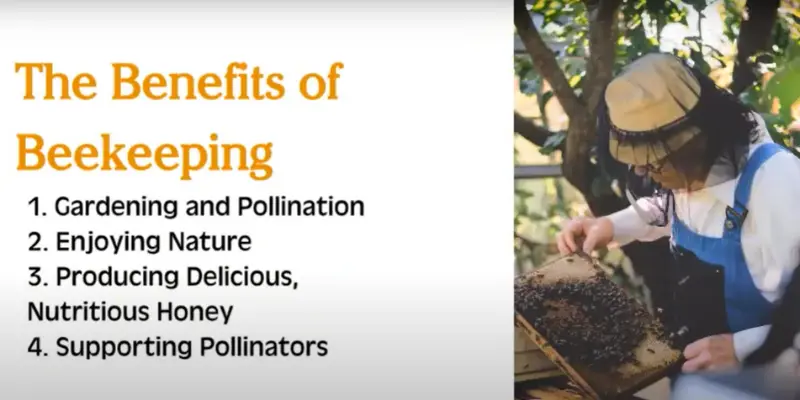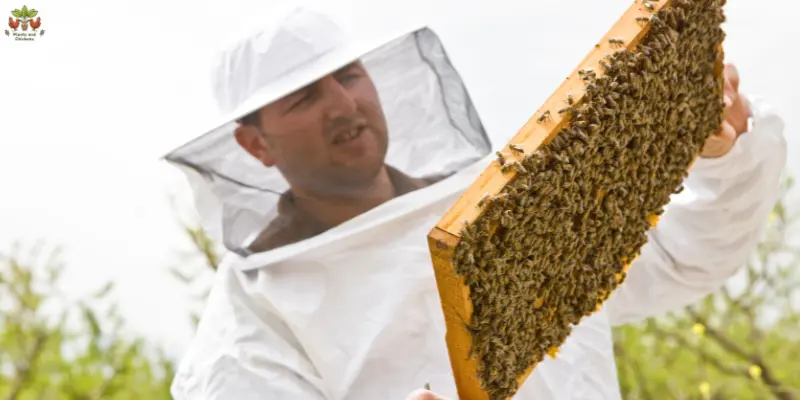Is Beekeeping Hard the Good the Bad and the Ugly? Beekeeping can be challenging due to factors such as pesticide poisoning and the difficulty of keeping bees alive during winter. It requires time, effort, continuous learning, and can be frustrating at times.
While maintaining backyard hives may seem like a solution to pollinator declines, honey bees can actually compete with native bees for resources. Despite the challenges, beekeeping plays a crucial role in ecosystem conservation and can be a rewarding experience for those willing to put in the effort.
Is Beekeeping Hard?
Beekeeping is a rewarding and fascinating hobby, but it does come with its fair share of challenges. From managing the bees’ health and survival to handling potential hazards, beekeeping requires dedication, knowledge, and practical skills. In this section, we will explore the challenges that beekeepers often face and provide some tips to make beekeeping a little easier.
Challenges In Beekeeping
- Pesticide Exposure: Beekeepers in farming areas need to be mindful of pesticide poisoning, as it can have harmful effects on their bee colonies. Ensuring that the bees have access to pesticide-free areas and providing protective measures can help mitigate this challenge.
- Winter Survival: The winter season poses one of the biggest challenges for beekeepers. Insulation, ventilation, and ensuring a mite-free environment are crucial to help the bees survive the cold months. Providing sufficient food reserves for the bees is also essential.
- Disease and Pest Management: Bees are susceptible to various diseases and pests, such as mites, wax moths, and hive beetles. Regular monitoring, prompt treatment, and implementing preventive measures are essential to maintain a healthy bee population.
- Swarm Control: Bees tend to swarm when their hive becomes overcrowded. Preventing swarming and managing the division of the colony requires proactive beekeeping techniques and understanding the behavior of bees.
- Honey Harvesting: While harvesting honey is a rewarding aspect of beekeeping, it can also present challenges. Managing the extraction process and ensuring that the bees have enough honey reserves for themselves can be a delicate balance.

Tips To Make Beekeeping Easier
To make the beekeeping journey smoother, consider the following tips:
By staying informed, taking proactive measures, and being attentive to the needs of your bee colonies, you can make beekeeping a more manageable and rewarding experience.
The Good Side Of Beekeeping
Beekeeping can be challenging, especially when dealing with factors like pesticides and ensuring bees survive the winter. However, despite the difficulties, beekeeping offers valuable learning experiences and the opportunity to contribute to pollinator conservation.
Beekeeping And Learning
As with any new venture, beekeeping comes with a learning curve. However, the process of acquiring knowledge and skills in beekeeping is one of the most rewarding aspects of this hobby. Exploring the intricacies of bee behavior, understanding hive management techniques, and learning about the different types of bees can be fascinating and intellectually stimulating.

Positive Impact Of Beekeeping
Beekeeping goes beyond just the personal fulfillment of learning. It also has numerous positive impacts on the environment and the community. Here are some of the ways beekeeping can make a difference:
As you embark on your beekeeping journey, remember that the learning process and the positive impact you can make are the good side of beekeeping. Stay curious, stay passionate, and keep buzzing with excitement as you delve into the fascinating world of bees.
The Bad And Ugly Side Of Beekeeping
Beekeeping can be a challenging endeavor, especially when dealing with issues like pesticide exposure and ensuring bee survival during winter. However, it offers valuable learning opportunities and a chance to contribute to bee conservation efforts.
Negative Effects On Native Bees
Beekeeping, although widely recognized for its benefits, is not without its negative effects on native bees. While keeping honey bees can have positive impacts on certain crops and the environment, it can also pose challenges for wild bees that are essential for pollination. A single honey bee hive can consist of tens of thousands of individuals, competing directly with native bees for nectar and pollen. This competition can limit the available resources for native bees, potentially leading to a decline in their populations.
Furthermore, the introduction of honey bees into an area can disrupt the natural ecosystem balance. Native bees have evolved alongside local plants, forming intimate relationships based on pollination. However, the presence of honey bees can interfere with these relationships, as they may outcompete native bees for resources, leading to a decrease in their pollination services.
Common Difficulties In Beekeeping
Beekeeping is not an easy endeavor, and aspiring beekeepers need to be prepared for the challenges it brings. Some common difficulties in beekeeping include:
- Pesticide Exposure: If you are located in a farming area, your bees may be at risk of exposure to pesticides. Pesticides can have devastating effects on bee health, leading to population declines and weakened immune systems.
- Surviving the Winter: Arguably the most challenging part of beekeeping is ensuring that your bees survive the winter. Insulation, ventilation, mite control, and providing ample food are crucial for the hive’s survival during the colder months.
- Disease and Parasite Management: Bees can be susceptible to various diseases and parasites, such as Varroa mites and fungal infections. Maintaining healthy hives requires proactive management strategies, including regular inspections, treatment protocols, and monitoring for signs of illness.
- Maintaining Queen Health: The queen bee is vital to a hive’s productivity and overall success. However, queens can experience health issues or become less productive over time. Beekeepers must be vigilant in monitoring and managing the queen’s health to ensure colony strength.
These challenges highlight the importance of continuous learning and staying updated on beekeeping best practices. Beekeepers must be dedicated and proactive in addressing these difficulties to ensure the well-being and productivity of their bee colonies.
Frequently Asked Questions For Is Beekeeping Hard The Good The Bad And The Ugly
Why Is Beekeeping So Hard?
Beekeeping is hard because it requires dealing with pesticides, ensuring bee survival during winter, and maintaining a mite-free, well-insulated and well-fed hive. It takes time, effort, and continuous learning. Beekeeping can be frustrating and challenging at times.
Is It Hard To Be A Beekeeper?
Beekeeping requires time, effort, and continuous learning. It can be challenging and frustrating at times, but it is a rewarding hobby. Factors like pesticides and winter survival can make it even more difficult. However, with proper insulation, ventilation, and food supply, you can make beekeeping easier.
What Are The Bad Things About Beekeeping?
Beekeeping can have some drawbacks, such as dealing with pesticides that could harm the bees. Surviving winter can also be challenging, requiring the beekeeper to ensure insulation, ventilation, and enough food for the hive. It takes time, effort, and continuous learning, and can sometimes be frustrating.
Additionally, honey bees can compete with native bees for nectar and pollen.
Is Beekeeping Good Or Bad For Bees?
Beekeeping has both positive and negative impacts on bees. While beekeeping can provide shelter and protection for bees, it can also put them in direct competition with native bees for resources. Overall, beekeeping should be focused on creating a favorable habitat for all bees rather than solely relying on honey bees.
Conclusion
Beekeeping may not be an easy task, but the rewards can be worth it. From dealing with pesticides to ensuring the survival of bees during winter, there are challenges that beekeepers face. However, beekeeping also offers opportunities to learn and grow.
Despite frustrations and setbacks, it is an endeavor that can be both fulfilling and beneficial for the environment. So, if you’re willing to put in the time and effort, beekeeping can be a rewarding and worthwhile pursuit.


![Terrifying Trend: Why Do Roosters Chase Humans? [2024]](https://plantsandchickens.com/wp-content/uploads/2024/02/why-do-roosters-chase-humans-4.webp)


Leave a Reply